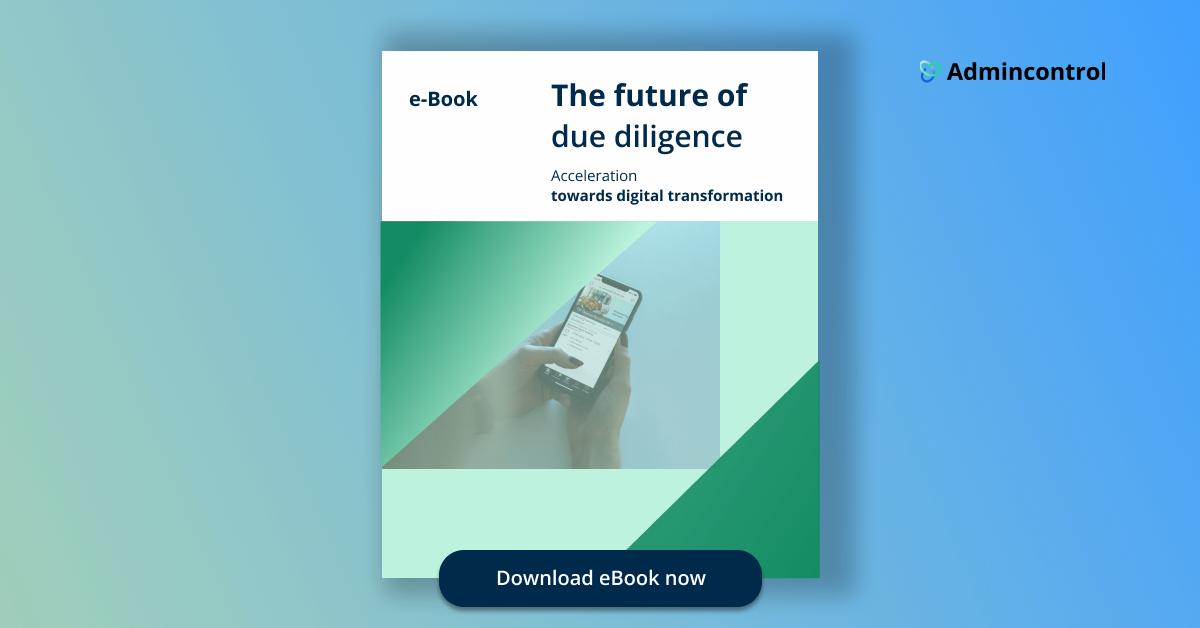In a transaction context, sustainable and responsible investments are often described as ESG, which stands for “Environmental, Social and Governance”. Briefly, this covers environmental issues, social responsibility and corporate governance and the term can include anything from money laundering, corruption, board composition, greenhouse gas emissions to security and employee rights.
Many administrators take ESG into account in the investment process, typically because they want to reduce risk and increase the likelihood of optimal long-term returns. In this blog post, we look more closely at the investment risks associated with ESG and why Due Diligence is so important in this process.
ESG is a big trend
ESG has clearly become a trend in an international context. In a survey conducted by PwC in 2022, it emerged that ESG assets under management (AUM) will increase by 53% to US$19.6tn in Europe. This undoubtedly means that those planning M&A activity need to consider the impact of ESG.
– Shareholders, investors and other stakeholders largely expect companies to focus on sustainability. Overall, there is an ever-increasing expectation that the business community is doing its part to meet sustainability goals and show corporate social responsibility. In other words: If it is revealed that a company has been involved in human rights violations or child labour, this can have a significant negative impact on the company, explains Kristin Nordland Brattli.
She is a senior lawyer at Wikborg Rein and works full time on ESG and compliance. Ole Henrik Wille is a partner at Wikborg Reins’ Oslo office and is head of the company’s M&A group.
Kristin Nordland Brattli and Ole Henrik Wille explain that ESG has become significantly more important in connection with M&A transactions.

Not risk-free
– Are there any investment risks associated with ESG?
– Yes, there are and, in a transaction context, we could divide the risk into several categories.
Firstly, ESG constitutes a financial risk in a transaction. One scenario could be that conditions associated with ESG are not sufficiently reflected in the price. For example, non-compliance with corruption rules may entail both fines and the loss of major contracts which, of course, is relevant to the pricing of the company.
Secondly, the reputational risk can be high. If you purchase a company in which serious environmental pollution or human rights violations have been uncovered, this could also have negative reputational consequences for the party acquiring the company.
Thirdly, non-compliance with ESG conditions could entail a legal risk. For example, a buyer may risk “inheriting” legal liability for historical offences in the target, including both criminal liability and/or liability for compensation.
Furthermore, if an ESG DD is not made before the transaction, there is also a risk that criminal acts continue in the new organisation as they had previously, i.e. if, for example, no corruption risk has been identified in the target before the transaction and the company does not have adequate procedures to deal with such risk, there is a possibility of also being in breach of corruption legislation after the company has been taken over.
ESG Due Diligence is key
In order to avoid investing in “dirty” projects, it is important to conduct a thorough ESG DD – early in the process.
– When should you get started with an ESG DD?
– You should determine as soon as possible whether ESG is relevant to the transaction, and the extent to which it is relevant. The actual ESG DD should, at the latest, be started at the same time as other DD processes. This is because issues uncovered through an ESG DD could actually become a deal breaker. For example, if you discover that child labour has been used in the company you were interested in, this will most likely result in a “no deal”. It’s better to uncover such issues early in the process than after you’ve bought the company.
– So, what’s the purpose of an ESG DD?
The purpose is firstly to understand the target’s risk profile and risk exposure. This could include, for example, where the company operates, which sector the company belongs to and the company’s business partners and customers. Any red flags should also be identified.
Furthermore, preventive measures in the target should be identified and assessed, including whether the company itself has good procedures and routines in place for preventing violations of relevant laws and regulations. This will then provide a basis for assessing the “residual” risk in the company and whether there is a level of risk that is acceptable to the buyer or whether there are issues that should be rectified before completing the transaction.
How do you do you complete ESG due diligence?
The following measures should be taken in order to implement an ESG DD:
- Establish a data room with Q&A features
- Review relevant documents in the data room
- Conduct interviews with key personnel at the company
- Conduct integrity and background checks (for example, check whether key personnel in the company have previously been associated with corruption).
- If necessary, conduct accounting analyses/transaction testing
- In high-risk projects an on-site review could also be necessary, for example, a factory visit
- Conduct a risk assessment, an analysis and make a recommendation
Help with sustainable investments
– Can you get help with sustainable investments?
– In 2020, the EU amended their existing regulation on sustainable investments, establishing a legal framework to assess which investments and issuers qualify as sustainable.
There are also several players in the market who offer ESG ratings and these could provide some idea of a company’s handling and compliance with ESG. Nevertheless, when acquiring a company, it is essential to make a tailored ESG DD in order to specifically assess this company’s ESG and sustainability profile.
To learn about how AI is accelerating the due diligence process, download our guide:




